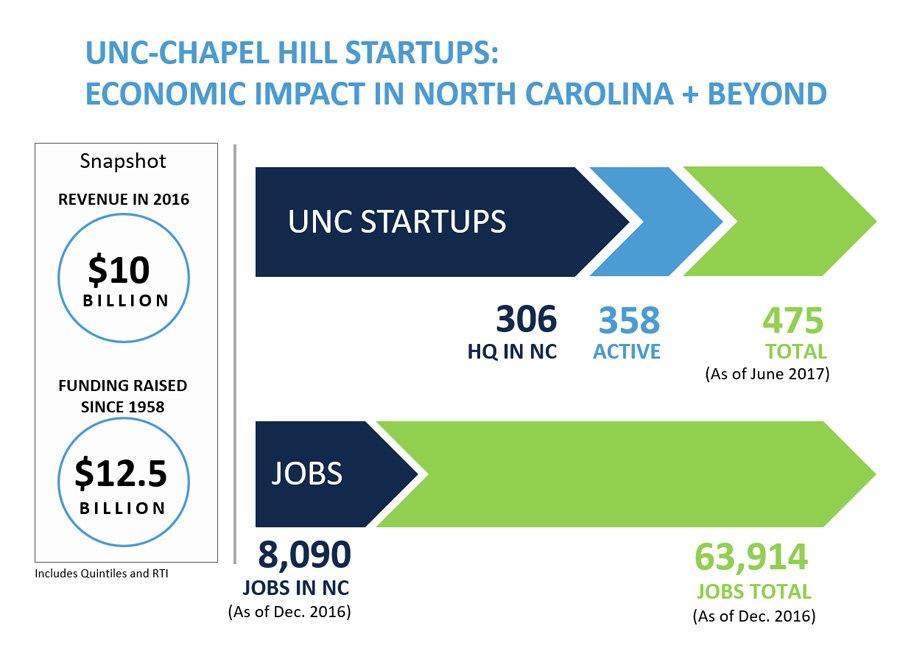How university startups deliver an economic boost – and improve lives – in North Carolina communities
 By JUDITH CONE
By JUDITH CONE
Vice Chancellor for Innovation,
Entrepreneurship and Economic Development
University of North Carolina at Chapel Hill
If the State of North Carolina was actively recruiting a company promising to bring 8,000 good jobs with revenues of $10 billion, that would attract significant interest. Hold that thought.
The next time you’re sitting with a friend or work colleague, ask what comes to mind when he or she hears the word “entrepreneur.” The response likely would be words like “startup company,” “Silicon Valley,” “business plan,” “mobile app,” “revenue,” “economy” or “jobs.”
Do you think they would respond with the word “university?” Not so likely. At first pass, entrepreneurship seems like an odd fit with the view many people have about universities as places people go to learn, teach and research. Of course, these are all fundamental purposes of institutions of higher learning. But quickly becoming core to the mission of many universities is an entrepreneurial approach to converting university-born ideas into practical benefit for people locally and globally.
The entrepreneurship-education connection
Students and faculty at our universities share with successful entrepreneurs a talent for generating multitudes of promising ideas. After all, inquisitive minds come to universities to think, analyze, test, explore, experiment and discover. Many wish to go beyond idea generation and convert their ideas into practical benefit for the public good. Our institutions are focusing even more on being think tanks AND translational hubs. Preparing faculty, staff and students with an entrepreneurial mindset and skillset helps them amplify ideas that start in classrooms and labs. With a lot of university support and guidance, university-born entrepreneurs help take those ideas into the world to benefit doctors and patients, meet customer needs, generate revenues, create jobs and bring tremendous improvement to the lives of many.
Recall the promise of more than 8,000 good jobs a year to North Carolina from the company with annual revenues of $10 billion mentioned previously. Fortunately, those numbers are not hypothetical – they are the economic impact from the total contributions of 358 active startups affiliated with the University of North Carolina at Chapel Hill during 2016. In fact, the 8,000 jobs reflect only those located in North Carolina. These ventures created a total of 63,914 jobs worldwide. In addition, ventures connected to UNC-Chapel Hill have raised a cumulative of $12.5 billion in funding through 2016.
While the economic impact is significant, the human impact is equal to or even more important than the economic. Carolina innovators and entrepreneurs pour their ideas, passion and perseverance into companies and nonprofits that are feeding the hungry, creating clean energy solutions, and accelerating new treatments for devastating diseases like cancer, AIDS and cystic fibrosis. They are seeking cures that were recently thought impossible, and offering new hope and better days to neighbors, friends and families.
Being able to report on these ventures requires a sophisticated data collection and management tool. The Innovate Carolina Startup Database, created by our research team, follows UNC-Chapel Hill-affiliated startups from 1958 to today. It allows us to track, analyze and report impact measures, serves as a tool for academic researchers, enables better management of entrepreneurial curricular and co-curricular programs, and helps us connect with experts around the globe on behalf of our startups.
With this comprehensive database now in place, we can discover insights on how to better cultivate faculty and student ventures and find opportunities to further accelerate economic development throughout the state.
Measuring the economic impact of commercial and social ventures
Our most recent mid-year analysis shows upward trends in how UNC-Chapel Hill’s startup companies and social ventures are growing across North Carolina, contributing to the changing workforce, and bringing revenue to local and global communities. The analysis includes ventures founded by faculty, staff and students during their time at UNC-Chapel Hill or within three years of graduating from or leaving the University. The data collection begins when social and commercial ventures are formed and tracks them over time. There are small firms, midsize, and fortunately for the state, established multinationals like Quintiles and Research Triangle International, which was co-founded by Duke University, NC State and UNC-Chapel Hill.
Mid-year data on UNC-affiliated ventures show:
- A 26 percent increase in the total number of ventures from June 2016 to June 2017 (475 compared to 378).
- 75 percent of the total Carolina-affiliated ventures launched since 1958 are still active (358 of 475 ventures).
- 85 percent of active ventures are headquartered across 16 North Carolina counties (306 of 358 ventures), an 8 percent increase from the 283 UNC-affiliated ventures based in North Carolina at this time in 2016.
- 99 percent of the $10 billion in annual revenue earned in 2016 by the ventures comes from those headquartered in North Carolina.
Many of these companies are pursuing new advances that improve the lives of citizens in North Carolina and beyond. Take, for example, the following Carolina startups, which made noteworthy progress in 2017:
- G1 Therapeutics, a clinical-stage oncology company in Research Triangle Park with ties to the UNC Lineberger Comprehensive Cancer Center, raised $108.6 million in an initial public offering in May. The company began trading on the NASDAQ Global Market under the ticker symbol “GTHX.” G1’s therapies protect cancer patients from the toxic effects of chemotherapy.
- Impulsonic, a 3D audio company that creates true-to-life sounds in virtual reality experiences and games, was acquired by Valve Corporation, a video game and digital distribution company. Impulsonic was founded by students and researchers from Carolina’s computer science department.
- Falcon Therapeutics is advancing a new approach using tumor-homing cells to treat glioblastoma cancer, the most common form of primary brain cancer and also one of the deadliest. The company recently raised $700,000 in a private equity stock offering, according to a Securities and Exchange Commission filing. It was founded by a professor at the Eshelman School of Pharmacy.
- 410 Medical has developed a novel medical device that rapidly infuses life-saving fluids during medical emergencies involving critically-ill patients. It received an investment from the Carolina Angel Network and is the first company to receive funding from Triangle Venture Alliance, a new investment partnership among angel networks from UNC-Chapel Hill, NC State University, Duke University and NC Central University. The company was co-founded by a physician with a clinical faculty appointment in pediatrics at the UNC School of Medicine.
- Seal the Seasons partners with local farmers and uses technology to flash freeze farm-grown produce at the peak of freshness to sell to consumers 12 months a year. The company, founded by a Carolina student, has raised $750,000 in funding and sells produce at a variety of grocery stores, including Harris Teeter, Lowes Foods, Fresh Market and Whole Foods.
A place where innovators thrive
Contributions to the economy and to the well-being of North Carolinians from university-born startups are yielding a strong return on investment. The results highlighted here are specific to UNC-Chapel Hill. Imagine the cumulative effect of startups launched at the public and private institutions of higher education across the state.
Today’s economic and social returns are rooted in our history. As the first public university, UNC-Chapel Hill was a startup in its own way. The people of North Carolina were its earliest investors, and they’ve continued to support the University for more than 200 years. In fact, North Carolina has a proud history of public investment in all its universities by citizens who believe in the role of education.
At Carolina, we believe it is our duty to reinvest in our citizens however we can. One way we do that is through what we call the Innovate Carolina Network. This is an interconnected alliance of people and university programs working in concert to give our faculty, students and alumni the knowledge, tools and resources they need to put their ideas to use for the public good. By working together, we make the most of our resources and serve citizens better by putting more ideas into action faster. We want Carolina to be a place where innovators thrive, so that communities, businesses and people across the state can, too.
In a way, the people of North Carolina are early investors in campus startups. And, as investors, they are seeing the strong returns. Soon, when our citizens are asked what they think of when they hear the word “entrepreneur,” they will proudly say “universities”, “jobs”, “economic growth”, and “innovation for all.”



James Moeser says
This is a powerful piece by Judith Cone. I love the thought that UNC itself was a start-up 225 years ago.